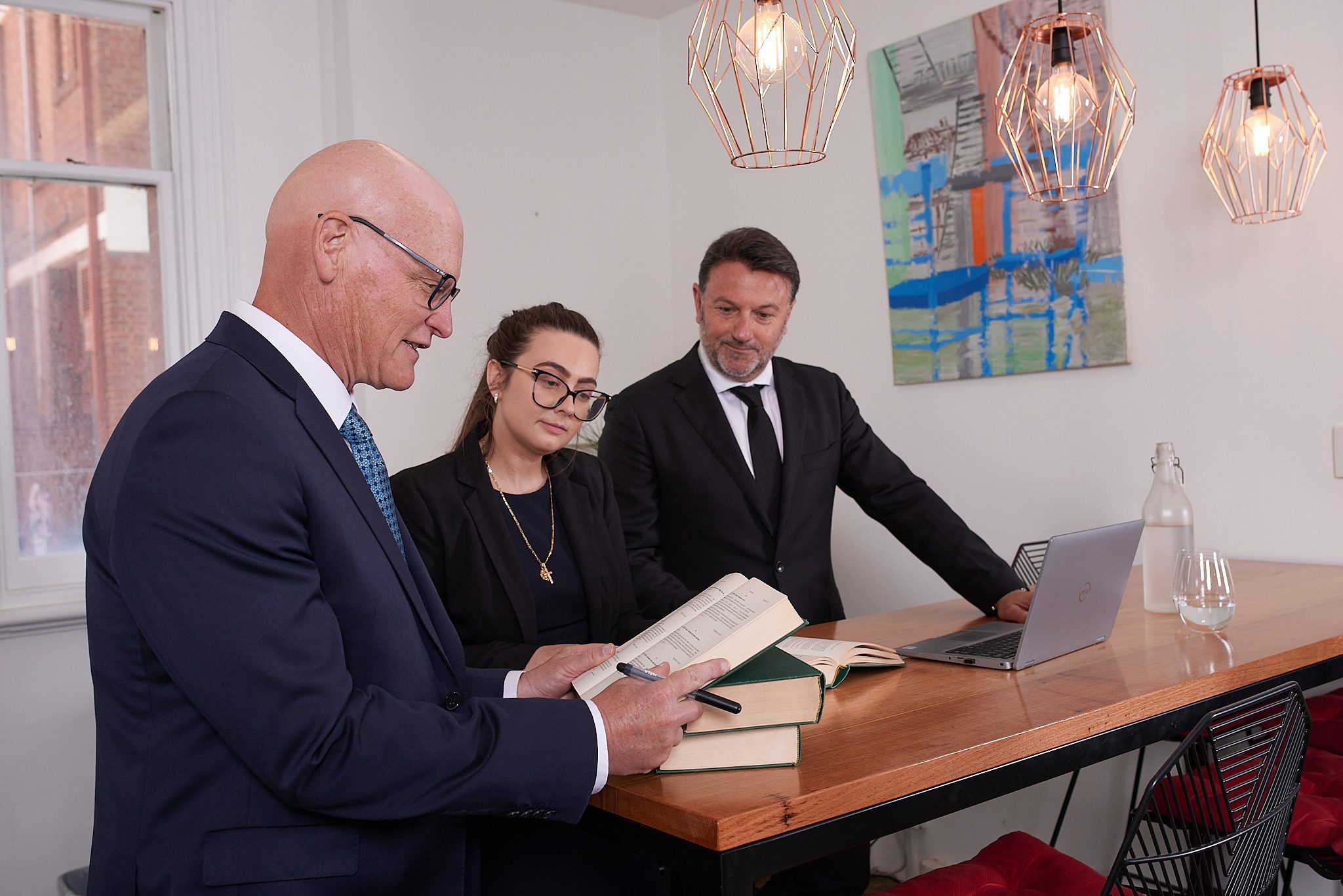Power of Attorney Lawyers
On this page
What does a power of attorney mean in South Australia?
In estate planning, a power of attorney is a legal document that allows someone else to make decisions and take actions on your behalf. In South Australia, a power of attorney can be granted for a specific purpose or for a broad range of decision-making authority.
For example, you might grant a power of attorney to someone to manage your financial affairs while you’re overseas. The person you grant the power of attorney to is known as the donee, and they have a legal duty to act in your best interests. Contact the power of attorney lawyers at Culshaw Bishop if you’re not sure who to grant this power.
It’s important to choose someone you trust to be your donee, as they will have significant control over important aspects of your life. It’s also important to understand the specific terms and limitations of the power of attorney you grant, as well as any legal requirements that may apply in your jurisdiction.
What is a power of attorney document?
A power of attorney in South Australia is a legal document that allows someone (the “donor”) to give another person (the “donee”) the power to act on their behalf in various legal and financial matters. This can include things like managing their finances, selling or buying property, or signing legal documents.
The power of attorney can be granted for a specific period of time or can be enduring, meaning it continues even if the donor becomes mentally or physically unable to make decisions for themselves.
The donee must always act in the best interest of the donor and within the limits set out in the power of attorney document. It is important to note that a power of attorney can be revoked at any time by the donor as long as they are capable of doing so.
What can a power of attorney do and not do?
The specific roles and responsibilities of the attorney will depend on the terms of the power of attorney document, which can be tailored to the needs and wishes of the donor.
Things an attorney can do
Some common roles and responsibilities of a donee appointed under a power of attorney in South Australia may include:
- Managing the donor’s bank accounts, investments, and other financial assets
- Paying bills and other expenses on behalf of the donor
- Buying and selling property or other assets on behalf of the donor
- Representing the donor in legal proceedings, if granted the appropriate powers in the document.
It’s important to note that a donee appointed under a power of attorney has a fiduciary duty to act in the best interests of the donor and must always act in good faith. Additionally, a donee must keep accurate records of all transactions made on behalf of the donor and must provide regular updates to the donor or other appointed parties, such as guardians or trustees.
Things an attorney cannot do
There are also certain things that an attorney cannot do, even if they are appointed under a power of attorney. For example, a donee cannot:
- Make decisions that are not within the scope of the powers granted in the document;
- Act in a manner that is contrary to the best interests of the donor act in a way that breaches their fiduciary duty to the donor;
- Make gifts of the donor’s property or assets, unless expressly authorised in the document; and
- Benefit financially from their role as donee, unless authorised in the document or by law.
If a donee acts outside the scope of their authority or breaches their duties, they may be liable for any resulting damages or losses to the donor.
What is the difference between power of attorney and enduring power of attorney?
The main difference between a power of attorney and an enduring power of attorney is that an enduring power of attorney remains valid even if the donor loses capacity. This means that the appointed donee can continue to act on behalf of the donor in the same way as before, even if the donor is no longer able to make decisions for themselves due to illness, injury, or other reasons.
In other words, the key difference between a power of attorney and an enduring power of attorney is the duration of the appointment. A power of attorney may become invalid when the donor becomes incapacitated, while an enduring power of attorney remains in effect even after incapacity.
It’s important to note that an enduring power of attorney must be made in writing and comply with specific legal requirements in South Australia. Additionally, the appointed donee must be trustworthy and capable of managing the donor’s affairs, as they may be required to make important decisions on behalf of the donor for an extended period of time.
Who can be a power of attorney?
In South Australia, anyone who is over 18 years of age and has the legal capacity to make decisions can be appointed as a power of attorney, subject to certain restrictions. This means that the appointed donee must be capable of understanding the nature and effect of the powers they are being given, and must not be under any legal disability that would prevent them from acting as a donee.
It’s important to choose a donee who is trustworthy and capable of managing the donor’s affairs, as they will be given legal authority to act on the donors behalf in important matters such as finances and property. The appointed donee must act in good faith and in the best interests of the donor, and must always act within the scope of the powers granted in the power of attorney document.
Additionally, there are certain restrictions on who can be appointed as a power of attorney in South Australia. For example, a person who is an undischarged bankrupt, a person who is under a legal disability, or a person who has been convicted of certain offences may be prohibited from acting as a donee. It’s important to seek legal advice when appointing a donee to ensure that they are eligible and capable of fulfilling their duties.
How do I appoint a power of attorney?
In South Australia, to appoint a power of attorney, the donor must follow these general steps:
- Decide on the type of power of attorney: The donor must decide on the type of power of attorney they need, whether it’s a general power of attorney, a limited power of attorney, or an enduring power of attorney. They may want to consult with a lawyer to help them make this decision.
- Choose a donee: The donor must choose a donee they trust to act on their behalf. This could be a family member, friend, or professional such as a lawyer or accountant. The donor has the option of appointing a sole donee, or joint donees. It’s important to choose a donee who is reliable, trustworthy, and capable of managing the donor’s affairs.
- Prepare the power of attorney document: The donor must prepare a written power of attorney document that sets out the powers they are giving to their donee. This document must comply with specific legal requirements in South Australia, and may need to be witnessed by a witness who is not the donee or a family member.
- Sign the document: The donor must sign the power of attorney document in the presence of a witness, who must also sign the document. If the donee is appointed under an enduring power of attorney, the document must also be signed by a medical practitioner or a prescribed witness who can attest that the donor had capacity at the time the document was signed.
- Register the document: The power of attorney document may need to be registered with the South Australian Office of the Public Advocate or the South Australian Land Titles Office, depending on the type of powers granted in the document. This will ensure that the document is valid and enforceable.
It’s important to seek legal advice when appointing a power of attorney, as the process can be complex and the document must comply with specific legal requirements. A power of attorney lawyer can also help ensure that the powers granted in the document are appropriate and tailored to the donor’s specific needs and wishes.
Using a power of attorney lawyer
The process of getting a power of attorney using a lawyer in South Australia generally involves the following steps:
- Consultation: The first step is to arrange a consultation with a lawyer who has expertise in drafting power of attorney documents. During this consultation, the lawyer will explain the different types of power of attorney and help the donor decide on the most appropriate type for their needs.
- Preparation of documents: Once the type of power of attorney has been decided, the lawyer will prepare the necessary legal documents. This will typically involve a power of attorney document that sets out the powers granted to the donee, as well as any other related documents that may be required.
- Review and signing: The donor will then have an opportunity to review the documents and ask any questions they may have. Once they are satisfied with the documents, they will sign them in the presence of a witness, who may be a lawyer or another qualified witness.
- Registration: The lawyer will then ensure that the power of attorney is properly registered, if necessary. This may involve registering the document with the South Australian Office of the Public Advocate or the South Australian Land Titles Office, depending on the type of powers granted in the document.
- Ongoing support: Finally, the lawyer may provide ongoing support to the donor and their donee as needed. This could include advice on how to use the power of attorney, assistance with managing the donor’s affairs, or guidance on how to deal with any legal issues that may arise.
Overall, using a power of attorney lawyer in South Australia can provide you with peace of mind knowing that your affairs are being managed by a trusted and qualified professional. It can also help ensure that the power of attorney is properly drafted, registered, and used in accordance with the law.
Using a DIY kit
Making a will using DIY will kits is becoming more popular in Australia. While it is technically possible to organise a power of attorney using a DIY will kit in South Australia, it is generally recommended to go through a power of attorney lawyer. This is because:
- Legal expertise
- Legal compliance
- Avoiding mistakes
- Protection against abuse
- Peace of mind
Overall, while DIY will kits may be tempting due to their lower cost and convenience, it is generally recommended to work with a wills and estates lawyer to ensure that the power of attorney is properly drafted, compliant with the law, and used appropriately.


